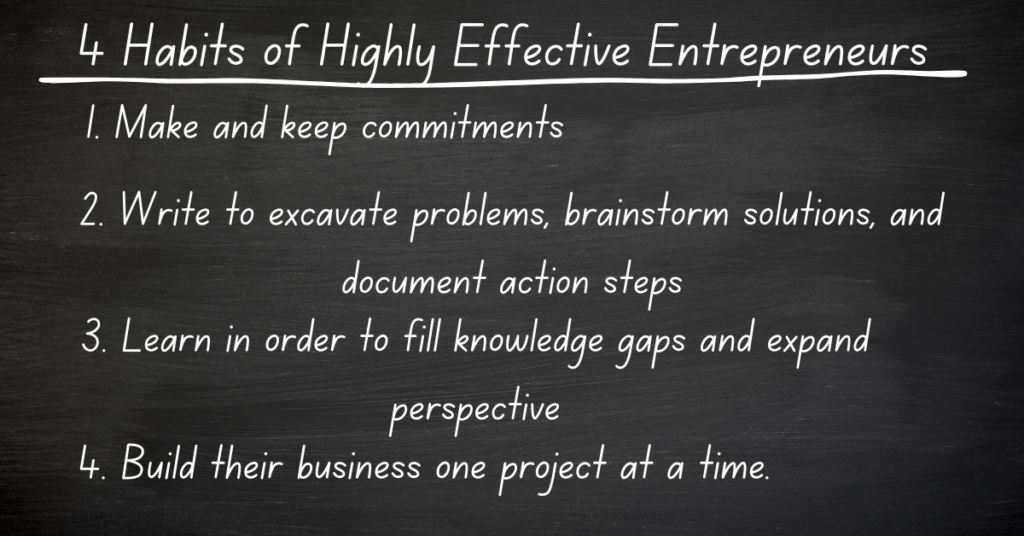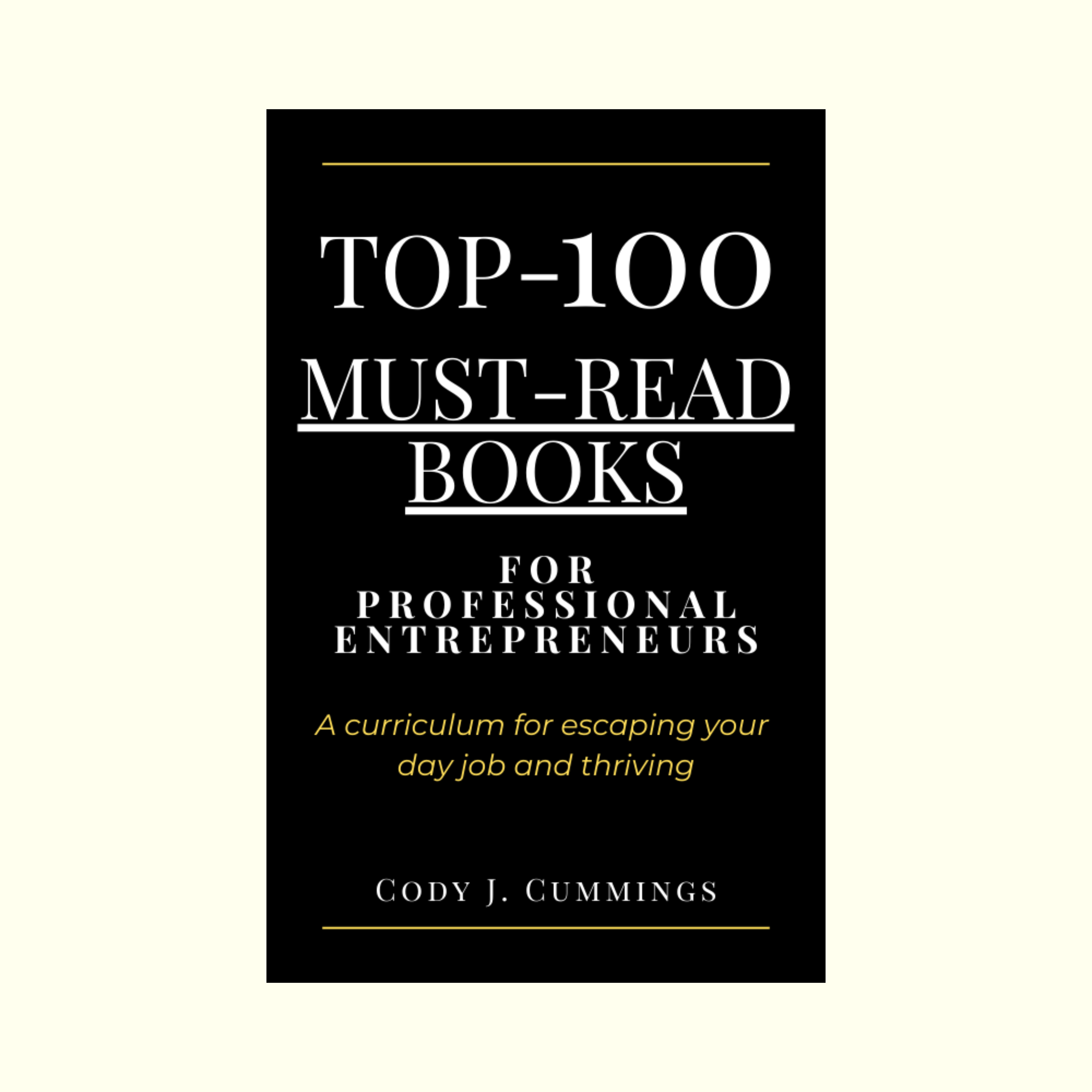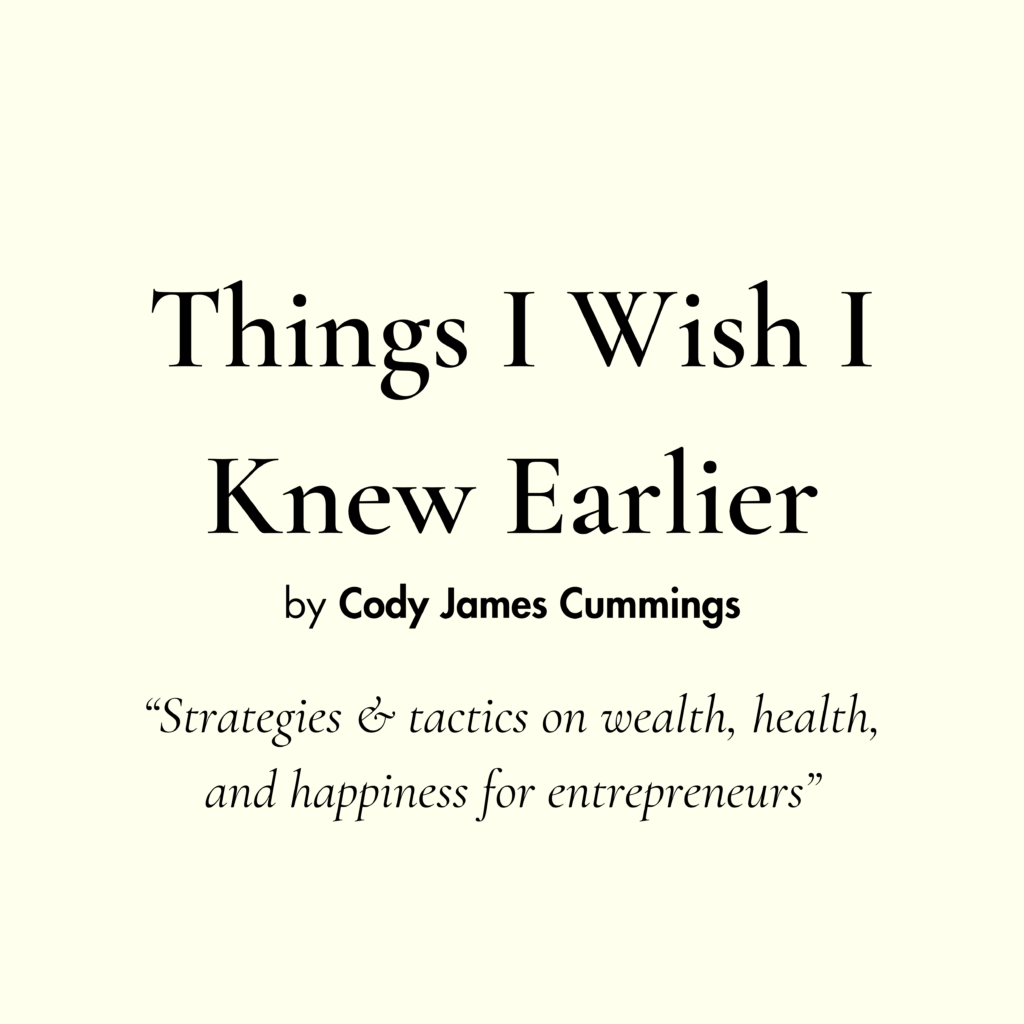“I want to become my own boss, but I don’t know where to start.”
The critical issue isn’t WHERE you start but THAT you start.
The goal is to establish a revenue stream that becomes your new, primary, full-time income.
To do that, you have to build enough momentum to break free of the gravitational field of your day job.
You need to reach escape velocity.
After watching many businesses succeed and fail and reading hundreds of books on the subject, I’m convinced that it is impossible to fail as an entrepreneur if you follow 4 simple steps.
- Make and keep commitments
- Write to excavate problems, brainstorm solutions, and document action steps
- Learn in order to fill knowledge gaps and expand perspective
- Build your business by completing project after project
I call these steps the Escape Velocity Sequence because they lift you out of the necessity of your day job if you do them long enough.
Just like a rocket has to reach a certain speed to escape Earth’s gravitational field, you have to build enough momentum in your business to escape the gravitational pull of your job.
Your day job is a center of gravity that is created out of the weight and density of your primary income.
We get caught inside their orbit by the fact that we rely on the income they provide to feed ourselves and our families.
But these are not one-off steps that you stop once you transition into running your business full-time.
These are the 4 primary habits of highly-effective entrepreneurs.
Here is my promise to you:
If you adopt these four habits, you will leave your day job for a lifetime entrepreneurship.
You will achieve financial abundance, control over your time, and a feeling of purpose and fulfillment.
Your life will become an adventure out of the darkness of scarcity, limitation, and quiet desperation that so often comes along with employment into the warm light of abundance, freedom, and fulfillment that can come with entrepreneurship (when it’s approached the right way).
Let’s look at each habit in detail so you can implement them in your life today.
1. COMMIT- make and keep commitments
The only way to fail as an entrepreneur is to quit.
The central character trait of all successful entrepreneurs is tenacity.
Merriam-webster defines tenacity as “the ability or willingness to carry on despite danger, difficulty, or obstacle.”
Grit. Perseverance. Determination.
The entire entrepreneurial adventure starts with a simple decision:
The decision to try.
Turn curiosity about entrepreneurship into an explicit, concrete goal:
“I will figure out how earn my full-time income as an entrepreneur.”
This is a template for the most basic affirmation of this kind.
A starting point for you, perhaps, if you don’t yet know the specific kind of venture you want to run.
And affirmations are powerful.
To affirm: “to state as a fact, usually forcefully.”
When I earned my real estate license, no one told me that most agents make $0 their first year.
And making $100,000 in your first year was just a myth.
It had rarely been done.

I busted my ass working 6-7 days per week 10+ hours per day for 6 months and made $1500.
On an index card, I wrote, “I will earn at least $100,000 in commissions in 2018.”
Each morning, I started my day by walking up a big hill next to my house with that index card reciting that affirmation over and over and over aloud.
I wanted it to pour into my body and spirit.
I wanted to declare it to the whole universe.
At this point, the idea that I could make $100,000 in a year was almost out of reach for me mentally.
I hardly knew anyone who made that much money.
Napoleon Hill taught me the power of auto-suggestion (or, thoughts you suggest to yourself) in his timeless best-seller The Law of Success.
If you are curious about why affirmations work or want to learn more about how to implement them in your life, I highly recommend that book.
I ended up earning about $130,000 in 2018.
During that year, I learned a lot about momentum.
When you start, you don’t have any.
And it’s really, really hard to get moving.
You have to pour a lot of energy into the business before it generates any revenue at all.
But when you refuse to quit and continue working, one day you pass an invisible threshold where all the energy you put in and all the momentum you built shows up in the form of results.
I made $1500 in the last 6 months of 2017 (my first 6 months in the business). $4,000 in January of the new year (2018), $14,000 in February, and an almost incomprehensible $35,000 in May.
It changed my life.
And I never turned back.
The first habit of highly effective entrepreneurs is making and keeping commitments.
The first step toward escaping your day job by becoming your own boss is to turn that into your primary goal and commit to yourself that you will keep trying to reach it until you succeed.
2. WRITE- write to excavate problems, brainstorm solutions, and document action steps
Entrepreneurship is professional thinking.
For some unknown reason, this is not the broad conception. But it’s true.
Entrepreneurs solve problems.
And we get paid in direct proportion to the size of the problems we solve, according to Elon Musk.
It takes a lot of thinking to articulate the problems you want to solve and illuminate the potential ways you can solve those problems.
You might think writing is for kids in school and not for adults.
But isn’t writing just intentional, proactive thinking?
Most people think in a mix of words and images.
Words themselves are phonetic representations of concepts.
Writing is thinking on paper.
Here is a list of some people you may have heard of who maintain(ed) life-long writing practices:
- Richard Branson
- Oprah Winfrey
- Tim Ferriss
- Benjamin Franklin
- Elon Musk
- Steve Jobs
- Bill Gates
- Marie Curie
- Charles Darwin
- Nikola Tesla
- Winston Churchill
- Coco Chanel
- George S. Patton
- Albert Einstein
“But what do I write about?”
Julia Cameron introduced me to the notion of free writing in her book The Artist’s Way.
When I found the book, I had been keeping a private journal for four years, where I documented ideas, life event, problems, and solutions.
But my practice was haphazard.
She calls her approach to free writing morning pages.
She outlines how to do them properly on her website:
“Morning Pages are three pages of longhand, stream of consciousness writing, done first thing in the morning.
There is no wrong way to do Morning Pages–
they are not high art.
They are not even ‘writing.’
They are about anything and everything that crosses your mind–
and they are for your eyes only.
Morning Pages provoke, clarify, comfort, cajole, prioritize and synchronize the day at hand.
Do not over-think Morning Pages:
just put three pages of anything on the page…and then do three more pages tomorrow.”
Free writing is the simplest and most effective way to write your way to full-time entrepreneurship and beyond.
This curious, wandering approach is the straightest available path.
Sit down and write out the thoughts that are swirling around your head.
Extract the thoughts from your mind onto the page.
- What are you afraid of?
- What are you avoiding?
- What are you worried about?
Just write it down.
Grammar, spelling, sentence structure, none of it matters.
All that matters is that you get the thoughts out of your head and onto paper.
You will be blown away by how much mental clarity will come from this simple exercise.
Anxiety and depression will plummet.
Confidence will increase.
If this technique is a bit too open-ended, use the method I call the How/Why/What technique to jump start your writing session.
Write these questions on the page, then answer them:
- How do I feel?
- Good/Bad
- Why do I feel this way?
- Write out in as much detail as possible precisely why you think you might feel good or bad
- This will help you illuminate and articulate the problems that are making you feel bad or the great things that are making you feel good
- What can I do about it?
- Then you can work to solve the problems and replicate the great things
- This is where you generate action lists
The reason this kind of writing is an essential practice for aspiring and professional entrepreneurs is because building your dream business is nothing more than solving a series of problems.
What kind of business should you build? Problem.
How do you open an LLC? Problem.
How do you receive payment? Problem.
How do you maximize profit? Problem.
But it runs deeper than that.
There is no clear distinction between an entrepreneur’s personal life and the business they are building.
Your personal problems (toxic intimate relationship, bad health, etc) are barriers between you and your dream business, too.
The second habit of highly effective entrepreneurs is writing.
The second step toward escaping your day job by becoming your own boss is to write your way your way forward by illuminating problems, brainstorming solutions, and documenting action steps.
3. LEARN- learn to fill knowledge gaps to solve problems and expand perspective
A friend of mine takes pride in the fact that he hasn’t read a single book all the way through since graduating from high school.
This mindset is holding millions of aspiring entrepreneurs in day jobs they don’t want to work.
The modern K-12 education system was built by industrialists to produce factory workers.
During the Industrial Revolution, we harnessed the power of machines to create wealth and abundance never seen before on Earth (as far as we know).
The machines needed operators. And industrialists could pay people several times their annual earnings from farming to come work in their factories.
Those same industrialists built and funded our modern education system with the purpose of creating good, obedient factory workers.
The goal of the education system is to turn naturally curious children into obedient employees by crushing their curiosity.
Teach them that learning is boring and painful.
Force them to memorize a bunch of dates and names when they are learning history.
Cajole them to recall a bunch of theories in math.
Compel them to read dry literature, then make them write papers on what they are made to read.
Sit them down inside desks in classrooms for set periods of time for the purpose of listening to adults talk about stuff they aren’t interested in.
Teach them to do as they’re told.
Never allow them to go outside.
Never allow them to play with one another.
Never allow them to attempt to learn things outside the curriculum.
Never tell them epic stories of daring adventure.
This approach has the two-fold advantage of making children hate learning and hate writing.
But the world no longer needs factory workers.
Every passing year moves us away from a jobs-based economy and toward an entrepreneur-based economy where knowledge work is the primary, high-value profession.
(As an aside, it is also true that many, many educators working inside the education system want to encourage rather than destroy curiosity. We are looking at the system at-large.)
You cannot rely on the institutional education system to educate you for the coming dominance of the creator economy.
You must self-educate.
Learning is the natural compliment to writing because you can only write about what you know.
Learning allows you to fill the gaps in your knowledge.
Learning helps you expand your perspective, which means awareness of new solutions and new problems.
Learning is the yang to the yin of writing.
They combine to represent your ability to think.

In an unexpected twist, the modern state of our education system is very good news.
Because it is our competitive advantage.
Entrepreneurs are professional thinkers.
One of my all-time favorite writers and thinkers is Ralph Waldo Emerson.
It is truly staggering that someone living in the early 1800s could know as much as he did.
He read every day for several hours.
But he had to acquire books from libraries and private collections.
Each one was a prized possession for him.
He would travel across half the world to find the right one.
Now you can learn anything about anything from the comfort of your couch.
Internet search portals make the entire corpus of human knowledge available to everyone.
And AI is making that knowledge even more accessible.
You want to learn how to build a YouTube channel?
There are books and courses and free videos everywhere to teach you how.
You want to build an local service business?
Same.
You want to build a multi-billion dollar empire?
Same.
You are living in the only time in history where you can do just a little research to compile a list of resources that will give you all the knowledge you need to do anything you want.
The third habit of highly effective entrepreneurs is learning.
The third step toward escaping your day job by becoming your own boss is to learn your way forward by filling knowledge gaps and expanding perspective.
4. BUILD- build your business by completing project after project
Natural entrepreneurs are notorious for having shiny-object syndrome.
Other people love to tell us we have ADHD.
Everything changed for me when I moved to a project-based approach to work.
Instead of moving from project to project as each one comes to mind, build your way forward by
- Writing each project down
- Outlining the project
- Adding the project to your queue of projects
- Organizing your project queue relative to your priorities
- Setting aside work blocks to focus on the project that is first in the queue
- Continue working until the project is completed, or at least as completed as you’re able to make it
- Ship it, then move to the next project in the queue
Each project becomes a building block for your business.
They stack on top of each other over time to create the system as a whole.
And each new project you complete makes the entire set of projects more valuable.
I did all this in Apple Notes up until a couple of weeks ago when I downloaded Notion.
Notion is an information management tool (that you can use for free), and it is perfect for capturing, outlining, and prioritizing your projects.
Check it out here.
The fourth habit of highly effective entrepreneurs is building.
The fourth step toward escaping your day job by becoming your own boss is to build your way forward by completing project after project.
Conclusion
Entrepreneurs have to stop looking at these activities as being extras, bonuses, things it would be nice to do.
These habits are the foundation of every business owner’s job who wants to grow, iterate, and optimize their operation to make more money and live progressively more on their own terms.
I never want to hear this again:
“I want to become my own boss, but I don’t know where to start.”
Start by integrating the 4 Habits of Highly Effective Entrepreneurs into your life.
- Make and keep commitments
- Write to excavate problems, brainstorm solutions, and document action steps
- Learn in order to fill knowledge gaps and expand perspective
- Build your business by completing project after project

Free Ebook for Entrepreneurs

Our greatest untapped natural resource isn’t oil or sunlight.
It’s human potential.
99% of people who should be changing the world as entrepreneurs are trapped in day jobs.
Read these books to engineer your escape.
Free Newsletter for Entrepreneurs

Join a community of aspiring and professional entrepreneurs learning Big Ideas every Sunday reading the Things I Wish I Knew Earlier Newsletter
